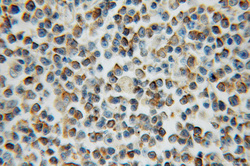Antibody data
- Antibody Data
- Antigen structure
- References [4]
- Comments [0]
- Validations
- Western blot [1]
- Immunohistochemistry [1]
Submit
Validation data
Reference
Comment
Report error
- Product number
- 11934-1-AP - Provider product page

- Provider
- Proteintech Group
- Proper citation
- Proteintech Cat#11934-1-AP, RRID:AB_2227438
- Product name
- ARL15 antibody
- Antibody type
- Polyclonal
- Description
- KD/KO validated ARL15 antibody (Cat. #11934-1-AP) is a rabbit polyclonal antibody that shows reactivity with human, mouse, rat and has been validated for the following applications: IHC, IP, WB,ELISA.
- Reactivity
- Human, Mouse, Rat
- Host
- Rabbit
- Conjugate
- Unconjugated
- Isotype
- IgG
- Vial size
- 20ul, 150ul
Submitted references CNNM proteins selectively bind to the TRPM7 channel to stimulate divalent cation entry into cells.
ARL15 overexpression attenuates high glucose-induced impairment of insulin signaling and oxidative stress in human umbilical vein endothelial cells.
ADP-ribosylation factor-like GTPase 15 enhances insulin-induced AKT phosphorylation in the IR/IRS1/AKT pathway by interacting with ASAP2 and regulating PDPK1 activity.
A genome-wide association study reveals variants in ARL15 that influence adiponectin levels.
Bai Z, Feng J, Franken GAC, Al'Saadi N, Cai N, Yu AS, Lou L, Komiya Y, Hoenderop JGJ, de Baaij JHF, Yue L, Runnels LW
PLoS biology 2021 Dec;19(12):e3001496
PLoS biology 2021 Dec;19(12):e3001496
ARL15 overexpression attenuates high glucose-induced impairment of insulin signaling and oxidative stress in human umbilical vein endothelial cells.
Shen J, Liu M, Xu J, Sun B, Xu H, Zhang W
Life sciences 2019 Mar 1;220:127-135
Life sciences 2019 Mar 1;220:127-135
ADP-ribosylation factor-like GTPase 15 enhances insulin-induced AKT phosphorylation in the IR/IRS1/AKT pathway by interacting with ASAP2 and regulating PDPK1 activity.
Zhao J, Wang M, Deng W, Zhong D, Jiang Y, Liao Y, Chen B, Zhang X
Biochemical and biophysical research communications 2017 May 13;486(4):865-871
Biochemical and biophysical research communications 2017 May 13;486(4):865-871
A genome-wide association study reveals variants in ARL15 that influence adiponectin levels.
Richards JB, Waterworth D, O'Rahilly S, Hivert MF, Loos RJ, Perry JR, Tanaka T, Timpson NJ, Semple RK, Soranzo N, Song K, Rocha N, Grundberg E, Dupuis J, Florez JC, Langenberg C, Prokopenko I, Saxena R, Sladek R, Aulchenko Y, Evans D, Waeber G, Erdmann J, Burnett MS, Sattar N, Devaney J, Willenborg C, Hingorani A, Witteman JC, Vollenweider P, Glaser B, Hengstenberg C, Ferrucci L, Melzer D, Stark K, Deanfield J, Winogradow J, Grassl M, Hall AS, Egan JM, Thompson JR, Ricketts SL, König IR, Reinhard W, Grundy S, Wichmann HE, Barter P, Mahley R, Kesaniemi YA, Rader DJ, Reilly MP, Epstein SE, Stewart AF, Van Duijn CM, Schunkert H, Burling K, Deloukas P, Pastinen T, Samani NJ, McPherson R, Davey Smith G, Frayling TM, Wareham NJ, Meigs JB, Mooser V, Spector TD, GIANT Consortium
PLoS genetics 2009 Dec;5(12):e1000768
PLoS genetics 2009 Dec;5(12):e1000768
No comments: Submit comment
Supportive validation
- Submitted by
- Proteintech Group (provider)
- Main image

- Experimental details
- mouse thymus tissue were subjected to SDS PAGE followed by western blot with 11934-1-AP(ARL15 antibody) at dilution of 1:300
- Sample type
- tissue
Supportive validation
- Submitted by
- Proteintech Group (provider)
- Main image

- Experimental details
- The ARL15 antibody from Proteintech is a rabbit polyclonal antibody to a recombinant protein of human ARL15. This antibody recognizes human,mouse,rat antigen. The ARL15 antibody has been validated for the following applications: ELISA, WB, IHC analysis.
 Explore
Explore Validate
Validate Learn
Learn Western blot
Western blot ELISA
ELISA